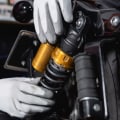Are you a motorcycle rider in Maryland? If so, you should be aware of the state's laws and regulations related to helmet use. In this article, we'll explain the Maryland helmet law requirements and provide you with the information you need to stay safe and legal on the roads. From the age at which helmets are required to the types of helmets allowed, understanding Maryland's helmet law can be essential for ensuring your safety while riding. Keep reading to learn more about what you need to know when it comes to helmet use in Maryland. The state of Maryland requires all motorcyclists, passengers, and riders of autocycles to wear helmets when operating or riding on a motorcycle. Helmets must meet the standards set by the United States Department of Transportation (DOT).
The DOT standard requires that helmets be labeled with a DOT sticker on the back and that they have a chin strap. In addition, helmets must fit properly in order to be effective. Helmets should be snug without being too tight, and they should not obstruct the rider’s vision or hearing. Riders should also make sure that the helmet does not move around when they are riding.
It is important to note that riders under 18 years of age must wear a full-face shield while operating their motorcycle. This rule applies to both drivers and passengers. It is also important to note that there are some exceptions to the helmet law. For example, riders on mopeds or scooters with engines that are 50cc or smaller are not required to wear helmets.
Additionally, members of approved motorcycle organizations such as the American Motorcyclist Association (AMA) or the Christian Motorcyclists Association (CMA) are exempt from wearing helmets if they are riding in an organized event or rally. Finally, riders should be aware that it is illegal to operate a motorcycle while impaired by alcohol or drugs. Riders can be charged with a DUI if they are found to be operating their motorcycle while impaired. While it may seem inconvenient to wear a helmet, it is much safer than going without one. Helmets can help protect riders from serious injury and even death in the event of an accident.
What Type Of Helmet Is Accepted?
In Maryland, motorcycle riders must wear helmets that meet the standards set by the United States Department of Transportation (DOT).The DOT standard requires that helmets be labeled with a DOT sticker on the back and that they have a chin strap. Furthermore, helmets must be made of protective materials such as polycarbonate or thermoplastic and must fit properly. In addition to the DOT sticker, it is important to look for other safety certifications when choosing a helmet. The Snell Memorial Foundation and the American National Standards Institute (ANSI) are two organizations that test and certify helmets.
A helmet with these certifications will provide better impact protection in the event of an accident.
Are There Exceptions To The Helmet Law?
Riders on mopeds or scooters with engines that are 50cc or smaller are not required to wear helmets in Maryland. Additionally, members of approved motorcycle organizations such as the American Motorcyclist Association (AMA) or the Christian Motorcyclists Association (CMA) are exempt from wearing helmets if they are riding in an organized event or rally. The exemption for AMA and CMA members is limited and riders must be participating in an officially sanctioned event or rally in order to be exempt from the helmet law. Riders should check with their local chapter of AMA or CMA to verify if an event qualifies for the exemption. Furthermore, riders should always carry proof of their membership in an approved organization.Who Is Required To Wear A Helmet?
All motorcyclists, passengers, and riders of autocycles are required to wear a helmet when operating or riding on a motorcycle in Maryland.According to the state's helmet law, all riders must wear protective headgear which meets the standards of the Department of Transportation (DOT). The helmet must also be securely fastened with a strap and be equipped with either a face shield, goggles, or safety glasses. Any rider who is under the age of 18 must wear a helmet at all times when riding a motorcycle. Riders over the age of 18 are not required to wear a helmet if they have completed an approved safety course. However, even if they have completed a safety course, it is still strongly recommended for all riders to wear a helmet. It is important to note that wearing a helmet is not only required by law in Maryland, but it is also essential for your safety.
According to the National Highway Traffic Safety Administration (NHTSA), helmets are estimated to be 37 percent effective in preventing fatal injuries for motorcyclists. Riding a motorcycle can be a fun and exciting experience, but it also comes with certain safety responsibilities. It is important for riders to know and understand Maryland’s helmet law requirements in order to stay safe while on the road. The helmet law in Maryland requires all motorcyclists to wear a helmet while riding, and the helmet must meet certain standards. There are exceptions to the law for those who have certain medical conditions or who are over 21 and have completed an approved safety course.
Ultimately, understanding and following Maryland’s helmet law requirements can help ensure that riders stay safe while enjoying their time on the road.



